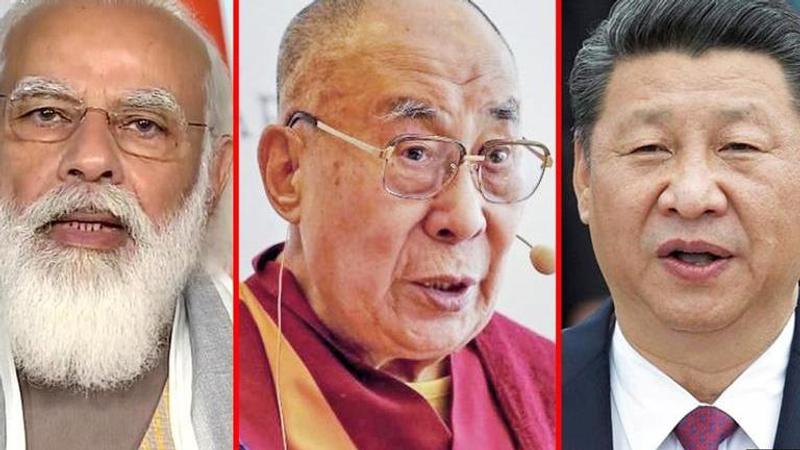Published 14:31 IST, April 17th 2021
Dalai Lama's succession triggers new clash between India, US & China
With the 14th Dalai Lama turning 86 this July, a struggle has ensued between India, the US & China on the choice of the next spiritual leader of the Tibetans

With the 14th Dalai Lama Tenzin Gyatso turning 86 this July, a struggle has ensued between India, the US and China on the choice of the next spiritual leader of the Tibetans.
The Dalai Lama is considered as a living Buddha who is reincarnated after his death of his predecessor. Traditionally, Tibetans begin a search for a child reincarnation of the Dalai Lama, and after identifying the boy, he studies to prepare for the role. There are many ways of choosing a Dalai Lama and the process can be long and complicated. The present Dalai Lama, who lives in exile in India, was identified at the age of 2.
According to a Bloomberg report, various senior officials in India, including in the Prime Minister's office, have been discussing how the country can influence the choice of the next Dalai Lama. India hosts the Tibetan government-in-exile in the city of Dharamsala and only recognized Tibet as part of China till 2003.
From January to March this year, India convened five separate assemblies of senior monks from various sects and schools along its Himalayan border with China. Such a gathering was organised for the first time in more than 2,000 years. India hopes that the group of senior monks will grant international legitimacy to the Dalai Lama's successor and lead the Tibetans in the interim period, as it could take over two decades for a reincarnation to come of age.
In 1959, US intelligence agents helped Tenzin Gyatso flee Tibet and take refuge in northern India to avoid being captured by Chinese security forces. The Dalai Lama has not laid out a clear succession plan. A decade ago, the monk issued a statement saying that when he turns 90, he would consult with other Tibetan Buddhist leaders whether the 600-year-old institution of the Dalai Lama should continue after his death.
Samdhong Rinpoche, who is part of the Dalai Lama's personal office, which will decide the succession, says that if Tibet remains occupied by China, The Dalai Lama has said he will be reincarnated outside Tibet and most likely in India. He added that while China may appoint its own Dalai Lama, its choice "will have no legitimacy."
China claims the right to choose the next Dalai Lama
Until last year, Rinpoche says, there was "semi-official communication" between the Chinese government and the Dalai Lama, during which the government tried to persuade the Dalai Lama to return to Tibet. His return would not be possible under the current political situation, Bloomberg quoted Rinpoche as saying.
In 2007, China issued an order to oversee the selection of the next Dalai Lama without the interference "of any foreign organization or individual." Chinese officials say there's a rule for China to be involved in picking the Dalai Lama, as the current one ascended to the position in 1939 after being approved by the then President Chiang Kai-shek.
China has said that potential successors should be chosen by picking lots from the golden urn in Jokhang Temple in Lhasa, Tibet's capital. When installed, the Dalai Lama must then get a "living Buddha permit" from the Chinese government.
The Dalai Lama has called that a "lie" and says the golden urn method was used to pick only two of the 14 Dalai Lamas since the first one was born in 1391. He said a different procedure, the "dough-ball method," could be used if there were multiple candidates. This method entails writing the names on a piece of paper, encasing them in dough balls, placing these in a bowl before a sacred object for three weeks, and then publicly rolling them around in the bowl until one falls out.
China has no role in the succession of Dalai Lama
The struggle over choosing the next Dalai Lama comes at a time when the Biden administration in the US is working more closely with its Asian partners to sanction China over human-rights abuses, restrict exports of key technology to the country, and push back against Bejing’s territorial claims, including over Taiwan. China responded by lashing out at the US and its allies, insisting they have no say in “internal matters” involving Tibet, Xinjiang, or others.
Last year, former President Donald Trump signed the Tibetan Policy and Support Act, which reiterates the US stand that the current Dalai Lama has the final authority on his reincarnation. In November 2020, the head of Tibet's exiled government was invited to the White House for the first time. The Biden administration is maintaining Trump's policy: "We believe that the Chinese government should have no role in the succession process of the Dalai Lama," State Department spokesman Ned Price said in March. Rinpoche says the U.S. policy is well-intentioned, but "the reincarnation of the Dalai Lama is entirely a spiritual matter for the people of Tibet."
Hindu-majority India, which was the birthplace of Buddhism, is looking to reassert its role as a protector of the religion. In the last few decades, its leaders saw the Dalai Lama's presence in the country as a "Tibet card" that could be used to pressure Chinese authorities by recognizing Tibet as an independent country. Their view of the Tibetan exile community has shifted recently, depending on relations with China.
As tensions heated between the countries following the Galwan clash along the India-China border, India last September openly acknowledged for the first time a secret military unit with Tibetan soldiers. China, too, sees value in using Buddhism to exercise power in Tibet and more broadly throughout Asia.
Updated 14:31 IST, April 17th 2021




